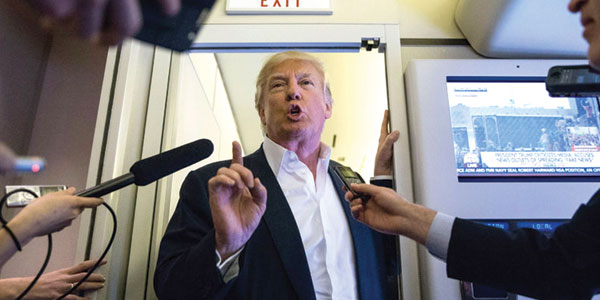
I’m preparing myself for four years (perhaps even eight) of the Trump administration. Yes, I’ve heard some very smart people — such as James Clapper, the former director of national intelligence — say that President Donald Trump is simply not presidential, or that they’re worried that Trump has control of the nuclear codes. But Trump won the election in November, and democracies are ruled by those who win elections.
Still, there is a growing number of commentators and politicians who believe that Trump could be impeached and removed from office. The special counsel, Robert Mueller, is investigating whether the Russian government worked with any Trump campaign officials to defeat Hillary Clinton. But as long as there’s no indisputable evidence proving that the results of the 2016 election were manipulated or that Trump or his close associates asked the Russians to interfere or worked with them to do so, he will remain in the White House.
Of course, the fact that he remains in the Oval Office doesn’t mean he’s right. Lately it seems that the president would prefer that journalists around this country be more like the state-controlled press back in the Soviet Union, or in today’s Cuba or North Korea — obsequious, biased, submissive and accommodating.
That will never happen in the U.S. The First Amendment protects journalists from efforts to restrict freedom of speech, so even if Trump wanted to, he can’t shut us up. Instead, he has tantrums and attacks us in public.
Just look at his recent 77-minute speech at his campaign-style rally in Phoenix, one of the most brutal attacks on the press ever made by a president. His rant featured accusations against journalists for creating “fake news” and labeled us enemies of the country. Clearly, the president was enraged.
But why all the fury? Trump was angry that journalists had correctly reported that he blamed “both sides” — racists and their opponents — for violence at a white supremacist rally in Virginia on Aug. 12. Because they reported, accurately, that Trump had said that there were some “fine people” among white-supremacist demonstrators. And because he described monuments depicting the Confederate leaders who defended slavery as “beautiful statues.”
Trump is also angry that the press keeps tracks of his lies. The Washington Post has been compiling an ongoing list tallying the president’s claims that were either lies or misleading statements since his inauguration in January. As of Aug. 22, that number was up to 1,057. Journalists are obligated to report when the president of the United States is not telling the truth.
They’ve also reported that Trump has made several racists remarks in the past: unfairly characterizing Mexican immigrants for being criminals and rapists, for instance, or saying that a judge couldn’t do his job effectively because his parents were of Mexican descent.
Trump doesn’t like when journalists tell the truth about his lying, or when we correct the facts that he’s citing or when we highlight his remarks about people from other ethnic groups, which would likely lead to the expulsion of a kid saying the same thing in a school. But we can’t expel the president — we can only objectively report the news and point out his mistakes. Such is our essential social role as journalists — to challenge the president and those in power.
And this is an essential critical role. We journalists are critical of Trump not because we are biased or because we hate the United States (as he wants people to believe). Our job is to accurately report on his failures and mistakes.
I’ve been covering dictators, tyrants and authoritarian leaders in Latin America for over 30 years. And as I’ve mentioned before, sometimes Trump reminds me of characters in Gabriel García Márquez’s novels who think that they are almighty and invincible. But the characters in the Colombian Nobel laureate’s novels and authoritarian leaders in real life always end up falling apart. Trump will not be an exception.
That’s my prediction: Trump will continue being president, and journalists will continue reporting whenever he lies or makes racist, sexist or xenophobic remarks. Trump will continue attacking us, for sure. But we journalists know what to do — the more attacks, the more journalism.
_____________________________________________________________________________________
Trump Contra la Prensa
Voy a decirlo desde un principio: Me estoy preparando para cuatro años (que podrían ser ocho) con Donald Trump en la presidencia. Sí, he escuchado a gente muy inteligente — como el ex asesor de Seguridad Nacional James Clapper — decir que Trump no está capacitado para ser Presidente y que le preocupa que tenga en sus manos los códigos para lanzar bombas nucleares. Sin embargo, Trump ganó la elección en noviembre pasado y en las democracias, gobiernan los que ganan.
También hay muchos que creen que Trump podría ser destituido. El fiscal especial, Robert Mueller, investiga si el gobierno ruso conspiró con la campaña presidencial de Trump para ganarle a Hillary Clinton, pero mientras no haya ninguna evidencia incontrovertible de que los resultados de la elección fueron manipulados o de que Trump personalmente pidió la intervención rusa, él seguirá en la Casa Blanca.
Sí, Trump es el Presidente y lo será por un buen rato, pero eso no significa que tenga siempre la razón. A él le gustaría que los periodistas independientes fuéramos como la prensa estatal en la antigua Unión Soviética o en las actuales Cuba y Corea del Norte: obsequiosos, partidistas, obedientes y serviles.
Nunca será así. Aquí en Estados Unidos la primera enmienda de la Constitución nos protege a los periodistas contra cualquier persona o ley que quiera limitar nuestra libertad de expresión y de prensa. Aunque Trump quiera, no nos puede callar. Por eso nos ataca en público, como en un berrinche.
Su discurso de 77 minutos en Phoenix ha sido uno de los más brutales ataques de cualquier presidente estadounidense en contra la prensa. Nos acusó desde falsificar noticias hasta ser enemigos del país. Trump estaba claramente enojado.
¿Por qué? Porque los periodistas, con razón, destacamos que culpó a “ambos lados” (racistas y sus opositores) de la reciente violencia en Virginia; que dijo que había “gente fina” entre los supremacistas blancos que se manifestaban; y que describió como “bellas estatuas” los monumentos que recuerdan a los líderes de la Confederación que defendieron la esclavitud. Por eso se enojó Trump. Ni modo.
Trump también se ha enojado porque la prensa lleva el conteo de sus mentiras. Desde su toma de protesta como Presidente en enero, The Washington Post ha estado compilando una lista en la que ha ido registrando todas las afirmaciones que ha hecho Trump y que son mentira o son érroneas. El 22 de agosto la cifra ya iba en 1,057. Los periodistas tenemos la obligación de informar cuando el presidente de los Estados Unidos no dice la verdad.
Sí, Trump es el Presidente, pero ha hecho varios comentarios racistas. Culpó injustamente a los inmigrantes mexicanos de ser criminales y violadores, además de decir que el juez Gonzalo Curiel no podía hacer bien su trabajo só-lo porque sus padres eran de origen mexicano. Los periodistas tenemos que informar a la gente cuando su presidente queda embarrado por coquetear con el racismo.
A Trump no le gusta cuando le cantamos sus verdades a la cara; cuando le decimos que miente, que se equivoca, que hace comentarios sobre personas de otros grupos étnicos que obligarían a la expulsión de cualquier niño estadounidense de la escuela. Sin embargo, al presidente no lo podemos expulsar de la Casa Blanca, así que nuestro único remedio es criticarlo y señalar sus errores. Esa es nuestra principal función social como periodistas: cuestionar al presidente y a los que tienen el poder.
Esto es importante. Los periodistas criticamos a Trump no porque seamos partidistas o porque odiemos a Estados Unidos (como él quiere hacerle creer a la gente). No, lo criticamos por sus propias faltas y errores.
Estoy bien entrenado. Durante más de 30 años me ha tocado cubrir a dictadores, déspotas y líderes autoritarios en América Latina. Trump a veces se parece a esos personajes de Gabriel García Márquez que se creen omnipotentes e invencibles. No obstante, en las novelas del Nobel colombiano — y en la realidad — esos personajes siempre acaban desmoronándose. Trump no será la excepción.
Así que este es mi pronóstico: Trump seguirá siendo Presidente y los periodistas seguiremos informando cuando diga mentiras y cuando haga comentarios racistas, sexistas y xenofóbicos. Trump seguramente nos seguirá atacando, pero los periodistas ya sabemos qué hacer: ante cada ataque, más periodismo.
(Jorge Ramos, periodista ganador del Emmy, es el principal director de noticias de Univision Network. Ramos, nacido en México, es autor de nueve libros de grandes ventas, el más reciente de los cuales es “A Country for All: An Immigrant Manifesto.”)










